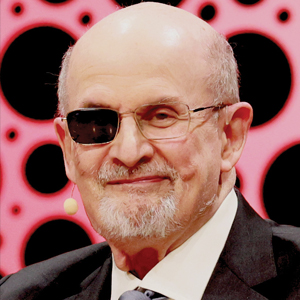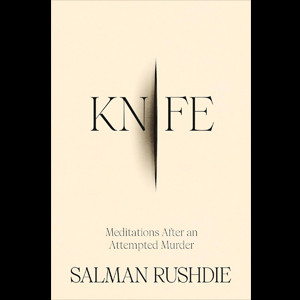Salman Rushdie: Life After “Knife”

When Joseph Anton, Salman Rushdie’s memoir about the so-called Rushdie Affair, came out, he was a University Distinguished Professor at Emory in Atlanta. He would not have expected to write a sequel. But he did, after nearly losing his life in a deadly knife attack in 2022. His compelling new memoir could be called Rushdie’s Rebirth.
[Left] Photo: Elena Ternovaja
We are almost two-thirds into Knife: Meditations After an Attempted Murder (Random House), Salman Rushdie’s haunting new memoir, when he gets to the nub of why his new book had to be nonfiction instead of another novel: “To write would be my way of owning what had happened, taking charge of it, making it mine, refusing to be a mere victim. I would answer violence with art.”
This isn’t writing as therapy. It’s a powerful story, and Rushdie tells it with his customary verve and wit. There’s another reason for its relevance. Ironically, that was what brought him—on the fateful morning of August 12, 2022—to the Chautauqua Institution in western New York state, where Rushdie appeared on stage to deliver a talk about the importance of protecting writers from harm. He never gave his speech. As the world knows, in a horrific attack that lasted only 27 seconds, the 75-year-old author was wounded 15 times, and his injuries included extensive damage to one arm and, more grievously, the loss of an eye.
His solace came, unexpectedly, from the sporting rather than the literary world. Rushdie mentions Mansoor Ali Khan (Tiger), the Nawab of Pataudi, who, despite losing an eye in a car accident when he was barely 20 years old, went on to have a stellar career as a Test cricket batsman and India’s captain. “I decided that the Tiger would be my role model,” he declares.
The attack’s graphic details, which won’t be included here, got media coverage. But it’s still shocking to learn, from Rushdie’s account of the day, how close he came to dying. Who was the assailant? An angry, aimless, and alienated young man—Rushdie simply calls him the A, which could stand for some choice epithets as well—who was then living with his mother in New Jersey. Why did he do it? Irrational and ill-informed, he’d been brainwashed by YouTube videos and the demons in his own mind. And he hadn’t read more than two pages of The Satanic Verses, the Rushdie novel which had triggered the infamous fatwa 35 years ago.
What’s also surprising to read is that, two days before the event, Rushdie had a nightmare in which he was being repeatedly stabbed by a gladiator in a Roman amphitheater. It spooked him. Nevertheless, Rushdie went to the modern-day amphitheater to honor his commitment, and because the fee would be handy for paying household bills. Fame and celebrityhood can be deceptive. Rushdie isn’t wealthy, even if he was known to hobnob with the glitterati, not just the literati. He is, above all, an artist who relies on his pen to make a living. His oeuvre encompasses 16 novels and six volumes of nonfiction including this book. There are many ways to get rich, but literary writing is low on that list.
Rushdie didn’t have to give his talk that day. In a tragic way, what he stood for became clear to everybody. “If you are afraid of the consequences of what you say, then you are not free,” he says, referring to a lesson he’d learned as a child in Bombay. While Rushdie doesn’t want to be defined by the fatwa and its fallout, he has made his peace with it.
He was lucky, strange though the word sounds, to survive the assault. The A was dangerously inept, even if he caused a lot of harm. But the biggest reason for Rushdie’s survival, besides the heroic action of attendees who rushed to his rescue, was the outstanding team of medical professionals who took care of him from day one.
Nobody played a more crucial role than Rushdie’s wife, Eliza, without whose love and unstinting support he might not have regained his equilibrium. Rachel Eliza Griffiths, an American poet, novelist, and visual artist, documented his recovery as well. Sameen, Rushdie’s sister, and his two sons, Zafar and Milan, who all visited from England, also provided much-needed comfort.
On the attack’s first anniversary, his anger having receded, Rushdie realized that three things had helped him deal with this life-altering incident: Time, therapy, and this book (which he was working on). To this list, one could add his close friends and family, especially his wife. The memoir, far from being grim, sparkles in many places, as when he displays his humor or writes about how he met Eliza (an incident at a PEN after-party feels like an eerie premonition).
A question not addressed in the book is the Chautauqua Institution’s culpability. Why were there no security personnel for a public event involving Rushdie, and how was the assailant able to get in with not one knife but several knives in a bag? Rushdie drolly wonders if he was planning to hand them out and ask audience members to join in. Chautauqua, a nonprofit arts and education institution as well as a summer resort, has beefed up the security now. It was too late for Rushdie, though perhaps they have taken responsibility for the lapse and are pitching in to defray some of the expenses for Rushdie’s long-term care.
 He notes, more than once, that this struggle between freedom lovers and freedom haters is also a battle between those with a sense of humor and the humorless. At the 2023 PEN Gala, where he received the Centenary Courage Award, Rushdie said, “Terror must not terrorize us.”
He notes, more than once, that this struggle between freedom lovers and freedom haters is also a battle between those with a sense of humor and the humorless. At the 2023 PEN Gala, where he received the Centenary Courage Award, Rushdie said, “Terror must not terrorize us.”
The section where Rushdie has an imaginary conversation with the attacker, while interesting, may divide readers, just as his decision to use a third-person rather than first-person point of view in his earlier memoir, Joseph Anton, divided readers.
Was Rushdie, by not being more vigilant, living in a fool’s paradise? Yes, there were mistakes, but there are no regrets because, for almost 23 years, he enjoyed freedom and a full life in New York. Following six weeks of convalescence in hospitals, he was relieved to return to the city.
More than any nation, Rushdie is drawn to cities—New York, London, Bombay (now Mumbai)—and that gives resonance to the title of his last novel, Victory City, whose publication was well-timed. Although broken and bruised, his escape from the jaws of death was a triumph, and he could celebrate the release of the novel in his beloved city. Its reception made him happy.
Rushdie was helpless on the day of the attack, but that doesn’t mean he lost. The assailant is in prison. Rushdie, on the other hand, is free—and he has his own knife, the knife of language which he wields with unmatched dexterity to fight back. One positive outcome is that more people are sympathetic and have come over to Rushdie’s side, realizing how high the stakes are in this battle of ideas. And so, life goes on for him, one day at a time. You bop until you drop, to borrow a phrase from Rushdie’s first interview (with The New Yorker) after the attack.
In 2012, at an Emory event to mark the publication of Salman Rushdie’s Joseph Anton: A Memoir, he said: “Defending the unspeakable is what freedom is about. Freedom of speech is the freedom on which all the other freedoms lie.”
Murali Kamma is the managing editor of Khabar magazine. A slightly different version of this article appeared in The Quint, a news and opinion media outlet based in India. Email: letters@khabar.com
Enjoyed reading Khabar magazine? Subscribe to Khabar and get a full digital copy of this Indian-American community magazine.
blog comments powered by Disqus














